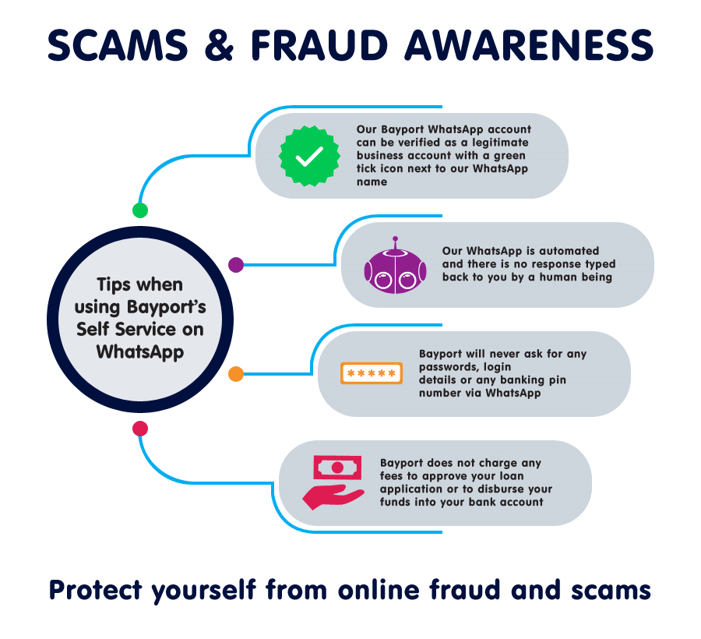Beware of scams
Fraud is a reality, but it doesn’t have to happen to you. Check in here regularly for fraud alerts and stay a step ahead of the scammers. If you suspect fraud, contact Bayport immediately on 087 287 4000.
Protect yourself from Whatsapp fraud and scams with the following tips:
- Our Bayport WhatsApp account can be verified as a legitimate business account with a green tick icon next to our WhatsApp name
- Our WhatsApp is automated and there is no response typed back to you by a human being
- Bayport will never ask for any passwords, login details or any banking pin number via WhatsApp
- Bayport does not charge any fees to approve your loan application or to disburse your funds into your bank account
- Click here to Download and save the Bayport Official WhatsApp Contact number. Save as a contact and start WhatsApp conversation with us to all our see self help options.
How to spot a scam
If the answer to even one of these seven questions is yes, it might be a scam:

1. Contacted out of the blue?
Do all you can to verify the identity of the caller. If you’re not 100% convinced of the identity of the caller, hang up and call the company from a different phone.

2. Is the deal too good to be true?
Scams often promises high loan amounts at very low interest rates and fees. If a deal sounds too good to be true, it usually is.

3. Asked to share personal details?
Phishing emails or phone scammers will often try to get valuable personal data from you. They can use this to steal your identity and/or your money. Never share your personal details unless you can verify the other person’s credentials beyond any doubt.

4. Pressurised to respond quickly?
Scammers will often try to hurry your decision making. Always take a breath and think things through. Never proceed unless you are absolutely certain that it is not a scam.

5. Are the contact details vague?
Look out for a PO Box number, personal email address or mobile number instead of office address and office phone number details.

6. Spelling or grammatical mistakes?
Legitimate organisations will rarely, if ever, make glaring spelling or grammatical mistakes.

7. Are you asked to keep it quiet?
Legitimate offers are never a secret.
Current and previous scams
Phishing is a type of online scam where criminals send an email that appears to be from a legitimate company asking you to provide sensitive information. This is usually done by including a link that supposedly takes you to the company’s website where you are asked to fill in your information – but the website is a clever fake and the information you provide goes straight to the crooks behind the scam.
A sim swap entails a fraudster using mobile banking to illegally transfer funds out of your bank account. Usually with inside assistance, the fraudsters get to know that you have applied for a loan at Bayport. They also receive information such as your identity number, bank account number and contact details. As soon as the loan has been disbursed, the fraudster contacts you, pretending to be from Bayport, and convinces you of the need to switch off your cell phone. This allows the perpetrator to do a sim swap on your number. The fraudster then registers you for mobile banking, accesses your bank account and makes off with your money
In this type of scam, a con artist persuades you to give him/her money in advance on the promise that you will receive something of a higher value later on. When Bayport’s name is used, the scammers will ask for an upfront fee to process your loan application. Bayport NEVER asks for upfront processing fees.
A form of phishing, smishing is when someone tries to trick you into giving them your private information via a text or SMS message. Smishing is a growing risk because people are sometimes more inclined to trust a text message than an email. While most people are aware of the security risks involved with clicking on links in emails, we tend to let our guard down when it comes to text messages.
